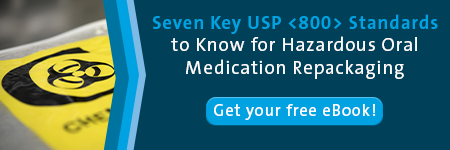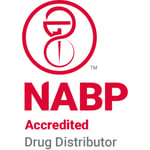The National Institute for Occupational Safety and Health (NIOSH) developed USP General Chapter <800> in 2019 to address the handling hazardous drugs in healthcare settings. These standards help to better protect workers and patients, as well as the general public and the environment.
With USP <800> now in effect, many hospital pharmacies are trying to navigate the dos and don’ts to remain compliant. A key part of USP <800> to be aware of is the "designated person".
What Is the USP <800> Designated Person Role?
Chapter 4 of USP <800> states that,
"Each entity must have a designated person who is qualified and trained to be responsible for developing and implementing appropriate procedures; overseeing entity compliance with this chapter and other applicable laws, regulations, and standards; ensuring competency of personnel; and ensuring environmental control of the storage and compounding areas. The designated person must thoroughly understand the rationale for risk-prevention policies, risks to themselves and others, risks of noncompliance that may compromise safety, and the responsibility to report potentially hazardous situations to the management team. The designated person must also be responsible for the oversight of monitoring the facility and maintaining reports of testing/sampling performed in facilities, and acting on the results. "
Because there is risk throughout every stage of the hazardous drug lifecycle, from receiving to disposal, USP <800> standards don't apply to just pharmacy alone. Instead, they encompass all personnel and departments that handle hazardous drugs. The designated person is responsible for overseeing compliance across their entire organization.
Overview of USP <800> Designated Person Responsibilities
-
Identify and maintain a list of hazardous drugs handled at the entity
-
Identify, document, and contain any causes of contamination
-
Perform and document Corrective Action and Preventive Actions (CAPAs), such as reevaluating work practices, retraining personnel, performing thorough deactivation, decontamination, cleaning, and improving engineering controls
-
Create and review hazardous drug handling standard operating procedures (SOPs) every 12 months and document this review
-
Manage any cases in which packages containing hazardous drugs are damaged or spilled according to SOPs
-
Develop training and assessment of competency for personnel for proper handling of hazardous drugs
-
Ensure environmental control of the storage and compounding areas
-
Ensure that appropriate personal protective equipment (PPE) is available and that personnel have been trained and can demonstrate competency on the proper use
-
Ensure proper cleaning, decontamination, and deactivation protocols are being followed in appropriate spaces
-
Serve as a content expert for handling hazardous drugs
Designing and Implementing the Designated Person Role
While USP <800> guidelines require the designation of one person who is qualified and trained, the guidelines don't provide requirements for specific experience or background, nor do they define how the role should be structured. Because of this, the designated person can look different for different-sized hospital systems.
While smaller hospitals will likely have one individual for their entire organization, it may not be feasible for mid- to large-sized hospital systems to have a single, centralized individual who is responsible for ensuring guidelines are followed across all locations. Instead, these entities may select a designated person for each individual site where hazardous drugs are handled.
Since the guidelines focus more on the actual responsibilities of the role, not how the role is selected or structured, this allows for hospitals to design the designated person role in a way that works optimally for their unique organization.
What remains true for all organizations, no matter how their designated person role is structured, is that this role is crucial to enhancing a culture of patient safety. Getting buy-in from senior-level management to make this role a priority and successfully establishing a qualified designated person shows commitment to quality and patient safety.
Compliance Isn't a Solo Job
Regardless of size, all organizations should consider establishing a working group of individuals from their pharmacy, nursing and administration, facilities, and quality or risk assurance departments. This interdisciplinary team, designated person included, would be collectively responsible for implementing USP <800> and other regulatory guidelines, standardizing procedures, and monitoring hazardous drug use within the organization.
Repackaging Hazardous Medications with Safecor Health
Implementing USP <800> standards within your in-house pharmacy can be challenging, but Safecor Health can help. We repackage many of the drugs on the NIOSH list to help alleviate the stress and reduce the costs associated with hazardous drug repackaging for in-house pharmacies.
As an FDA-registered facility, our processes guarantee more than just USP standards. We implement all current Good Manufacturing Practices (cGMP) for repackaging to further ensure the highest-quality product and reduce the risks of cross-contamination, label or bar code mix-ups, and packaging errors.
Safecor Health is here to help you. Get the list of hazardous drugs Safecor Health currently repackages.
Contact us to learn how we can help you with USP General Chapter <800> compliance.
Sources
https://www.pppmag.com/article/2718
https://www.pppmag.com/article/2352
https://www.pharmacytimes.com/view/identify-the-responsibilities-of-a-designated-person
https://www.readyfor800.com/getting-started-people-and-processes/



